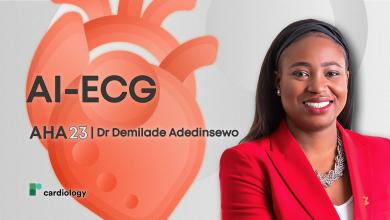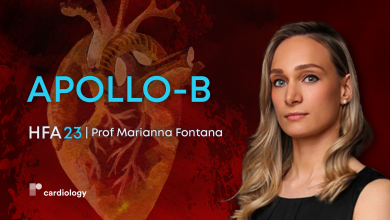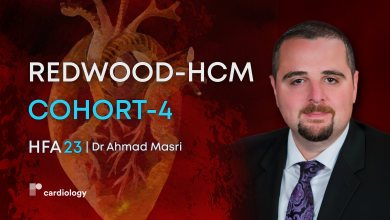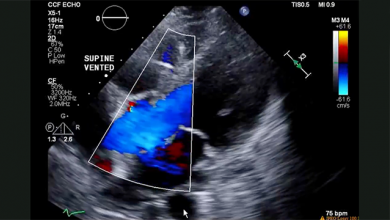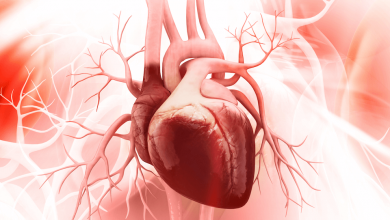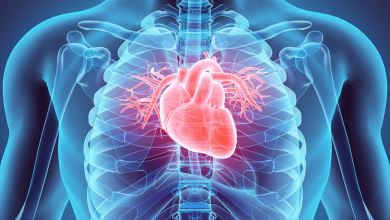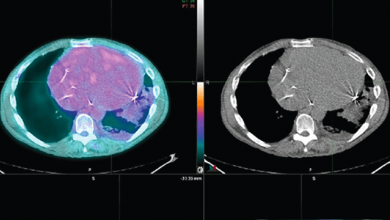In This Section:
Cardiomyopathy
Welcome to our featured section on cardiomyopathy
Click here to take the CME-accredited courses.
This educational hub pulls together the latest clinical data, guidelines, congress updates as well as original video content and expert interviews on the management of cardiomyopathies. Some of the content on this hub will be CME-accredited and credits will be available when viewed on Radcliffe Medical Education – our dedicated CME portal. Instructions on how to do so are provided with individual videos.

Section Advisor
Professor Perry Elliott
Chair, Cardiovascular Medicine, University College London, and Head, Clinical Research, UCL Institute of Cardiovascular Science, London, UK
Supported through an educational grant from Bristol Myers Squibb.
Video Series
Stefan Anker, Giuseppe Rosano, Javier de Juan Bagudá, et al
Broadcast
Elena Arbelo, Juan-Pablo Kaski,
Video
Video
Harriette Van Spall, James L Januzzi,
Video
Video
Robert Mentz, Harriette Van Spall,
Broadcast
e-SPACE HF 2023 – Day TwoWilliam T Abraham, Marianna Adamo, Stefan Anker, et al
Broadcast
e-SPACE HF 2023 – Day OneWilliam T Abraham, Marianna Adamo, Stefan Anker, et al
Video Series
Fausto J Pinto, Kerri L Cavanaugh, John Spertus, et al
Video Series
Marc Dweck, Milind Y Desai, Carolyn Ho, et al
Matthew E Li Kam Wa , Saba Z Assar , Ajay J Kirtane , et al
Alexander G Truesdell , Rhian E Davies , Moemen Eltelbany , et al
Recent Videos
Video
Harriette Van Spall, James L Januzzi,
Video Series
Vijay Chopra, Deepak L Bhatt, Michelle Wong, et al
Broadcast
e-SPACE CRM 2024 - Day 2Antonio Ceriello, Adeera Levin, Ileana L Piña, et al
Broadcast
e-SPACE CRM 2024 - Day 1Antonio Ceriello, Adeera Levin, Ileana L Piña, et al
Video Series
Stefan Anker, Giuseppe Rosano, Javier de Juan Bagudá, et al
Case Studies
Wertheim BM, Kapur S, Lakdawala NK, Carroll TL. J Voice 2023;37:97–100.
Pekas D, Chawda A, Desai N. BMJ Case Rep 2022;15:e250929.
Gabra B, Anavekar NS, Haaf P. Eur Heart J 2023;44:327.
Langley PC. Innov Pharm 2022;13:10.24926/iip.v13i2.4861.
Geske JB, Stephens EH, Dearani JA. Eur Heart J 2022;43:4518.
Yang D, Wang Y, Lu M. JACC Case Rep 2022;4:1042–8.
Kimmelstiel C, Everett KD, Jain P, et al. Circ Heart Fail 2022;15:e009171.
Wilson J, Muthumala A, Khanji MY. Eur Heart J 2022;43:1774.
Kadwalwala M, Chadha B, Ortoleva J, Joyce M. BMJ Case Rep 2021;14:e246059.
Mavilakandy A, Ahamed H. BMJ Case Rep 2022;15:e244573.
Sharma P, Jobanputra Y, Chait R, Ghumman W. BMJ Case Rep 2022;15:e246385.
Truong DT, Dionne A, Muniz JC, et al. Circulation 2022;145:345–56.
Raber I, Palmeri NO, Tahir UA, Zimetbaum PJ. Circulation 2022;145:622–5.
Lai FTT, Li X, Peng K, et al. Ann Intern Med 2022;175:362–70.
Weerasekare JM, Geske JB. Eur Heart J 2021;42:4775.
Lodge FM, Moody WE, Tosounidou S, et al. Lancet 2021;398:1913.
Clinical publications
Zhao X, Jin F, Wang J, et al. Int J Cardiol 2023;373:134–41.
Subramanian M, Sravani V, Krishna SP, et al. Am J Cardiol 2023;188:80–6.
Zhang Y, Zhu Y, Zhang M, et al. Eur Heart J Qual Care Clin Outcomes 2023;9:34–41.
Holst KA, Schaff HV, Smedira NG, et al. Ann Thorac Surg 2022;114:2131–8.
She J, Zhao S, Chen Y, et al. Acad Radiol 2023;30:230–8.
Miyamoto Y, Kubo T, Ochi Y, et al. Circ J 2022;86:1934–40.
Patlolla SH, Schaff HV, Nishimura RA, et al. J Am Heart Assoc 2023;12:e026661.
Suszko AM, Chakraborty P, Viswanathan K, et al. J Am Heart Assoc 2022;11:e026025.
Rowin EJ, Ruberg FL, Das G, et al. Circ Cardiovasc Imaging 2022;15:e014938.
Lentz Carvalho J, Schaff HV, Nishimura RA, et al. J Thorac Cardiovasc Surg 2023;165:79–87.e1.
Jin K. Eur J Prev Cardiol 2023;30:82–4.
Park JB, Yun JY, Kim B, et al. Eur J Prev Cardiol 2023;30:85–94.
Wheeler MT, Jacoby D, Elliott PM, et al. Eur J Heart Fail 2022; epub ahead of press.
Mentias A, Smedira NG, Krishnaswamy A, et al. J Am Coll Cardiol 2023;81:105–15.
Maron MS, Masri A, Choudhury L, et al. J Am Coll Cardiol 2023;81:34–45.
Wang L, Wang Y, Wang J, et al. Radiology 2022; epub ahead of press.
Sun D, Schaff HV, Van Houten HK, et al. Mayo Clin Proc 2022;97:1656–63.
Maron BA, Kleiner DE, Arons E, et al. Chest 2022; epub ahead of press.
Nezamabadi K, Mayfield J, Li P, et al. J Am Med Inform Assoc 2022;29:1879–89.
Britto-Borges T, Ludt A, Boileau E, et al. J Transl Med 2022;20:513.
Sun D, Schaff HV, Nishimura RA, et al. JACC Heart Fail 2022;10:831–7.
Nassif M, Fine JT, Dolan C, et al. JACC Heart Fail 2022;10:531–9.
Veselka J, Liebregts M, Cooper R, et al. JACC Cardiovasc Interv 2022;15:1910–7.
Lee DZJ, Montazeri M, Bataiosu R, et al. JACC Cardiovasc Imaging 2022;15:1696–711.
Jex N, Chowdhary A, Thirunavukarasu S, et al. Diabetes Care 2022;45:1852–62.
Goto S, Solanki D, John JE, et al. Circulation 2022;146:755–69.
Desai MY, Owens AT, Geske JB, et al. Circulation 2022; epub ahead of press.
Chaffin M, Papangeli I, Simonson B, et al. Nature 2022;608:174–80.
Conway J, Min S, Villa C, et al. Circulation 2022; epub ahead of press.
de Frutos F, Ochoa JP, Navarro-Peñalver M, et al. J Am Coll Cardiol 2022;80:1447–61.
Patel AP, Dron JS, Wang M, et al. JAMA Cardiol 2022;7:723–32.
Biddinger KJ, Jurgens SJ, Maamari D, et al. JAMA Cardiol 2022;7:715–22.
Duffy G, Cheng PP, Yuan N, et al. JAMA Cardiol 2022;7:386–95.
Zhou M, Ta S, Hahn RT, et al. JAMA Cardiol 2022;7:529–38.
Riaz M, Park J, Sewanan LR, et al. Circulation 2022;145:1238–53.
Desai MY, Tower-Rader A, Szpakowski N, et al. JAMA Netw Open 2022;5:e227293.
Tison GH, Siontis KC, Abreau S, et al. J Am Coll Cardiol 2022;79:1032–4.
Cui H, Schaff HV, Wang S, et al. J Am Coll Cardiol 2022;79:1647–55.
Norrish G, Cleary A, Field E, et al. J Am Coll Cardiol 2022;79:1986–97.
Dybro AM, Rasmussen TB, Nielsen RR, et al. J Am Coll Cardiol 2022;79:1565–75.
Desai MY, Owens A, Geske JB, et al. J Am Coll Cardiol 2022;80:95¬–108.
Kanamori H, Yoshida A, Naruse G, et al. J Am Coll Cardiol 2022;79:789–801.
Xie Y, Xu E, Bowe B, Al-Aly Z. Nat Med 2022;28:583–90.
Jackson AM, Petrie MC, Frogoudaki A, et al. Eur J Heart Fail 2021;23:2058–69.
Gigli M, Stolfo D, Graw SL, et al. Circulation 2021;144:1600–11.
Ranjbarvaziri S, Kooiker KB, Ellenberger M, et al. Circulation 2021;144:1714–31.
Raman B, Tunnicliffe EM, Chan K, et al. Circulation 2021;144:1656–8.
Hegde SM, Lester SJ, Solomon SD, et al. J Am Coll Cardiol 2021;78:2518–32.
Dybro AM, Rasmussen TB, Nielsen RR, et al. J Am Coll Cardiol 2021;78:2505–17.
Simone A, Herald J, Chen A, et al. JAMA Intern Med 2021;181:1668–70.
Cerrone M, Marrón-Liñares GM, van Opbergen CJM, et al. Eur Heart J 2022;43:1251–64.
Husby A, Hansen JV, Fosbøl E, et al. BMJ 2021;375:e068665.
Oster ME, Shay DK, Su JR, et al. JAMA 2022;327:331–40.
Huggins GS, Kinnamon DD, Haas GJ, et al. JAMA 2022;327:454–63.
Patone M, Mei XW, Handunnetthi L, et al. Nat Med 2022;28:410–22.
Mevorach D, Anis E, Cedar N, et al. N Engl J Med 2021;385:2140–9.
Witberg G, Barda N, Hoss S, et al. N Engl J Med 2021;385:2132–9.
Editorials
Geske JB, Siontis KC, Gersh BJ. Int J Cardiol 2023;373:99–100.
Gehi AK. J Am Heart Assoc 2022;11:e028095.
Ommen SR. JACC Heart Fail 2023;11:42–3.
Dominguez F, Cabrera E. Eur J Heart Fail 2023; epub ahead of press.
Maron MS. J Am Coll Cardiol 2023;81:116–8.
Nair A, Xie L, Silva Enciso JE. J Am Coll Cardiol 2023;81:46–8.
Mazine A, Tam DY, Fremes SE. J Thorac Cardiovasc Surg 2022;164:1511–3.
Wei LM. J Thorac Cardiovasc Surg 2022;164:1513–4.
Canepa M, Olivotto I. Circ Heart Fail 2022;15:e009873.
Rowin EJ, Maron MS. JACC Heart Fail 2022;10:540–2.
de Gregorio C, Luongo A. JACC Heart Fail 2022;10:838–41.
Pineda AM, Wang A. JACC Cardiovasc Interv 2022;15:1918–20.
Elliott PM, Lorenzini M. JACC Cardiovasc Imaging 2022;15:1712–4.
Lanfear DE, Reza N. J Am Coll Cardiol 2022;80:1462–4.
Blitzer D, Weiner SD, Nguyen SN, Takayama H. J Thorac Cardiovasc Surg 2022;163:1837–8.
Nguyen A. J Thorac Cardiovasc Surg 2022;163:1835.
Bianco F, Bucciarelli V. Eur J Prev Cardiol 2022;29:675–7.
Bataiosu DR, Rakowski H. JAMA Cardiol 2022;7:538–9.
Sherrid MV, Massera D, Swistel DG. J Am Coll Cardiol 2022;79:1656–9.
Ommen SR. J Am Coll Cardiol 2022;80:109–10.
Rossano JW, Lin KY. J Am Coll Cardiol 2022;79:1998–2000.
Borlaug BA, Omote K. J Am Coll Cardiol 2022;79:1576–8.
Larkin HD. JAMA 2022;327:2067.
Maron BJ, Maron MS, Sherrid MV, Rowin EJ. J Am Heart Assoc 2022;11:e024566.
Masri A, Olivotto I. J Am Heart Assoc 2022;11:e024656.
Guidelines
Brignole M, Cecchi F, Anastasakis A, et al. Int J Cardiol 2022; epub ahead of press.
Addis DR, Townsley MM. J Cardiothorac Vasc Anesth 2022;36:2143–53.
Saito C, Minami Y, Haruki S, et al. J Am Soc Echocardiogr 2022;35:469–76.
Nagueh SF, Phelan D, Abraham T, et al. J Am Soc Echocardiogr 2022;35:533–69.
Zegkos T, Tziomalos G, Parcharidou D, et al. Hellenic J Cardiol 2022;63:15–21.
Cheung CC, Roston TM, Davies B, et al. Can J Cardiol 2021;37:2001–13.
Bosman LP, Nielsen Gerlach CL, Cadrin-Tourigny J, et al. Europace 2022;24:296–305.
Radcliffe Content
Journal of Asian Pacific Society of Cardiology 2024;3:e05
Cardiac Failure Review 2024;10:e04.
Cardiac Failure Review 2024;10:e02.
Journal of Asian Pacific Society of Cardiology 2023;2:e44.
Arrhythmia & Electrophysiology Review 2023;12:e27
US Cardiology Review 2023;17:e17.
Cardiac Failure Review 2023;9:e12.
Journal of Asian Pacific Society of Cardiology 2023;2:e23.
Journal of Asian Pacific Society of Cardiology 2023;2:e15.
Cardiac Failure Review 2023;9:e08.
Journal of Asian Pacific Society of Cardiology 2022;1:e23.
Cardiac Failure Review 2022;8:e29.
European Cardiology Review 2022;17:e15.
Review Articles
Alenezi F, Alajmi H, Agarwal R, Zwischenberger BA. J Card Surg 2022;37:4186–9.
Cirino AL, Harris SL, Murad AM, et al. J Genet Couns 2022;31:1290–305.
Bruce C, Ubhi N, McKeegan P, Sanders K. Am J Cardiol 2023;188:110–9.
Capilupi MJ, Frishman WH. Cardiol Rev 2023;31:45–51.
Parker LE, Kramer RJ, Kaplan S, Landstrom AP. Trends Cardiovasc Med 2023;33:1–10.
Georgiopoulos G, Figliozzi S, Pateras K, et al. JACC Heart Fail 2023;11:30–41.
Dalo JD, Weisman ND, White CM. Ann Pharmacother 2022; epub ahead of press.
Ismayl M, Abbasi MA, Marar R, et al. Curr Probl Cardiol 2023;48:101429.
Calderon-Rojas R, Nguyen A, Nishimura RA, et al. J Thorac Cardiovasc Surg 2022;164:881–91.
Tamargo J, Tamargo M, Caballero R. Expert Opin Investig Drugs 2022;31:1027–52.
Pelliccia F, Cecchi F, Olivotto I, Camici PG. J Clin Med 2022;11:6560.
Tao J, Duan F, Long J, et al. J Am Soc Echocardiogr 2022; epub ahead of press.
Antonopoulos AS, Panagiotopoulos I, Kouroutzoglou A, et al. Eur J Heart Fail 2022;24:1677–96.
Semsarian C, Gray B, Haugaa KH, et al. J Am Coll Cardiol 2022;80:1268–83.
Corrado D, Link MS, Schwartz PJ. Eur Heart J 2022;43:3029–40.
Cui H, Schaff HV, Nishimura RA, et al. J Thorac Cardiovasc Surg 2022;164:1863–9.e1.
Lehman SJ, Crocini C, Leinwand LA. Nat Rev Cardiol 2022;19:353–63.
Keam SJ. Drugs 2022;82:1127–35.
Palandri C, Santini L, Argirò A, et al. Drugs 2022;82:889–912.
Raman B, Bluemke DA, Lüscher TF, Neubauer S. Eur Heart J 2022;43:1157–72.
Maron BJ, Rowin EJ, Maron MS. Annu Rev Med 2022;73:363–75.
Asatryan B, Asimaki A, Landstrom AP, et al. Circulation 2021;144:1646–55.
DeFilippis EM, Beale A, Martyn T, et al. Circ Res 2022;130:436–54.
Ning Q, Wu D, Wang X, et al. Signal Transduct Target Ther 2022;7:57.
Ntusi NAB, Sliwa K. J Am Coll Cardiol 2021;78:2573–9.
Ntusi NAB, Sliwa K. J Am Coll Cardiol 2021;78:2580–8.
Maron BJ, Desai MY, Nishimura RA, et al. J Am Coll Cardiol 2022;79:372–89.
Maron BJ, Desai MY, Nishimura RA, et al. J Am Coll Cardiol 2022;79:390–414.
Taha K, Kirkels FP, Teske AJ, et al. J Am Coll Cardiol 2022;79:594–608.
Walsh R, Offerhaus JA, Tadros R, Bezzina CR. Nat Rev Cardiol 2022;19:151–67.
Heymans S, Cooper LT. Nat Rev Cardiol 2022;19:75–7.
De Caterina R, Liga R, Boden WE. Eur Heart J 2022;43:387–90.
Bauersachs J, de Boer RA, Lindenfeld J, Bozkurt B. Eur Heart J 2022;43:367–76.
Karwi QG, Sun Q, Lopaschuk GD. Cells 2021;10:3259.
da Silva JS, Gonçalves RGJ, Vasques JF, et al. Cells 2022;11:240.
Ommen SR, Semsarian C. Lancet 2021;398:2102–8.






